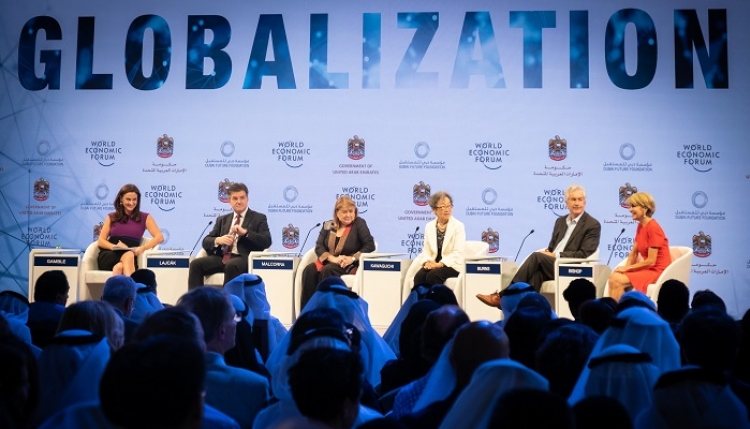The impact of globalisation in the face of the Fourth Industrial Revolution was the topic under discussion at the opening plenary session at the World Economic Forum’s Annual Meeting of the Global Future Councils, which opened yesterday (Sunday) at Madinat Jumeirah.
Taking part in the panel discussion titled ‘Globalisation 4.0’ were Julie Bishop, Member of Parliament of Australia and Former Minister of Foreign Affairs; William Burns, President, Carnegie Endowment for International Peace, USA; Yoriko Kawaguchi, Visiting Professor and Fellow, Meiji Institute for Global Affairs, Musashino University, Japan; Miroslav Lajcak, Minister of Foreign and European Affairs of the Slovak Republic and Susana Malcorra, Former Minister of Foreign Affairs of Argentina. The session was moderated by Hadley Gamble, Reporter and Anchor, CNBC, UK.
Opening the discussion, Julie Bishop highlighted the significance of the November 11 date of the start of the forum and highlighted that during her time as a Member of the Australian parliament, she noticed that certain countries and players were challenging the status quo of the norms and conventions that had shaped the policies of the international order that had arisen after the Second World War.
“I think that it’s noteworthy that we’re meeting today on the hundredth anniversary of the end of the First World War, which was followed by the Second World War, and after that the nations of the world came together and said ‘we need a framework to guide how nations behave and towards each other.’ My challenge is to nations that are seeking to undermine that rules-based order, or to nations that say ‘we can go it alone or we can cherry pick which parts of the order we will accept, or which be guided by or which we will not,’ where’s the alternative? I’ve yet to see an alternative model that can deal with the challenges of global cooperation and global competition,” Bishop said.
Highlighting the increasing disillusionment between citizens and their governments in this new Fourth Industrial Revolution era, Susana Malcorra stressed that there were voices that were exploiting the fears of the future by suggesting that a return to earlier values was the answer.
“At the heart of what we are facing here is the fact that the common citizen does not feel himself or herself represented well enough by the institutions – either national or international. There is a break, in my view, in the social compact between the citizens and their leadership. So, this is really an inward-looking perspective for the citizens. The citizens feel themselves not only not well represented but also that their future is at stake. It’s not clear to them why their future is at stake, but they blame their leadership. Here comes the opportunity for other voices to say that we can go back to the past. And guess what – we cannot go back to the past, that’s a fact,” said Malcorra.
During his participation, Miroslav Lajcak drew attention to the fact that there were still large swathes of the global population who do not have access to basic services and that it was just as important to address their needs, as it was to focus on gearing up for a technological future in the era of the Fourth Industrial Revolution. “As we are planning for the Fourth one, let us not forget that by 2050 this planet will be hosting close to 10 billion people,” Lajcak said.
Comparing between foreign and internal policies in nations, Yoriko Kawaguchi indicated that domestic policies are of great importance in address technological challenges, as they contribute strongly to the development of societies and overcoming the challenges posed by the Fourth Industrial Revolution.
The Annual Meeting of the Global Future Councils ran from November 11-12 at Madinat Jumeirah, Dubai.

